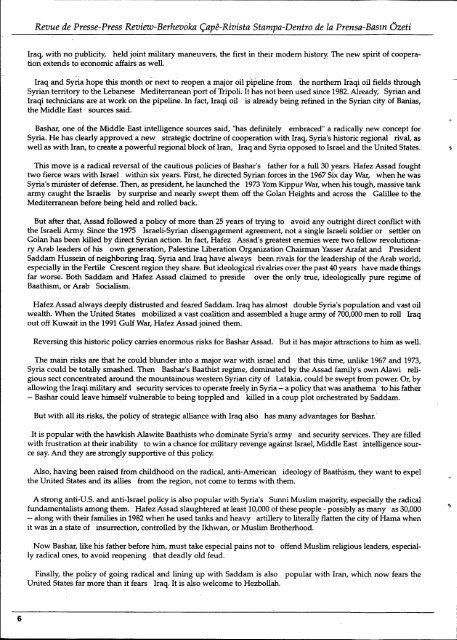Bulletin de liaison et d'information - Institut kurde de Paris
Bulletin de liaison et d'information - Institut kurde de Paris
Bulletin de liaison et d'information - Institut kurde de Paris
You also want an ePaper? Increase the reach of your titles
YUMPU automatically turns print PDFs into web optimized ePapers that Google loves.
---- - ----------------------------~<br />
Revue <strong>de</strong> Presse-Press Review-Berhevoka<br />
Çapê-Rivista Stampa-Dentro <strong>de</strong> la Prensa-Bilszn Öz<strong>et</strong>i<br />
Iraq, with no publicity, held joint military maneuvers, the first in their mo<strong>de</strong>m history. The new spirit of cooperation<br />
extends to economic affairs as well.<br />
Iraq and Syria hope this month ornext to reopen a major oil pipeline from the northern Iraqi oil fields through<br />
Syrian territory to the Lebanese Mediterranean port of Tripoli. It has not been used since 1982.Already, Syrian and<br />
Iraqi technicians are at work on the pipeline. In fact, Iraqi oil is already being refined in the Syrian city of Banias,<br />
the Middle East sources said.<br />
Bashar, one of the Middle East intelligence sources said, "has <strong>de</strong>finitely embraced" a radically new concept for<br />
Syria. He has clearly approved a new strategic doctrine of cooperation with Iraq, Syria's historic regional rival, as<br />
well as with Iran, tocreate a powerful regional block of Iran, Iraq and Syria opposed to Israel and the United States.<br />
This move is a radical reversal of the cautious policies of Bashar's father for a full 30 years. Hafez Assad fought<br />
two fierce wars with Israel ~within six years. First, he directed Syrian forces in the 1967 Six day War, when he was<br />
Syria's minister of <strong>de</strong>fense. Then, as presi<strong>de</strong>nt, he launched the 1973YomKippur War,when his tough, massive tank<br />
army caught the Israelis by surprise and nearly swept them off the Golan Heights and across the Galillee to the<br />
Mediterranean before being held and rolled back.<br />
But after that, Assad followed a policy of more than 25 years of trying to avoid any outright direct conflict with<br />
the Israeli Army. Since the 1975 Israeli-Syrian disengagement agreement, not a single Israeli soldier or s<strong>et</strong>tler on<br />
Golan has been killed by direct Syrian action. In fact, Hafez Assad's greatest enemies were two fellow revolutionary<br />
Arab lea<strong>de</strong>rs of his own generation, Palestine Liberation Organization Chairman Yasser Arafat and Presi<strong>de</strong>nt<br />
Saddam Hussein of neighboring Iraq. Syria and Iraq have always been rivals for the lea<strong>de</strong>rship of the Arab world,<br />
especially in the Fertile Crescent region they share. But i<strong>de</strong>ological rivalries over the past 40 years have ma<strong>de</strong> things<br />
far worse. Both Saddam and Hafez Assad claimed to presi<strong>de</strong> over the only true, i<strong>de</strong>ologically pure regime of<br />
Baathism, or Arab Socialism.<br />
Hafez Assad always <strong>de</strong>eply distrusted and feared Saddam. Iraq has almost double Syria's population and vast oil<br />
wealth. When the United States mobilized a vast coalition and assembled a huge army of 700,000men to roll Iraq<br />
out off Kuwait in the 1991 Gulf War, Hafez Assad joined them.<br />
Reversing this historic policy carries enormous risks for Bashar Assad.<br />
But it has major attractions to him as well.<br />
The main risks are that he could blun<strong>de</strong>r into a major war with israel and that this time, unlike 1967 and 1973,<br />
Syria could be totally smashed. Then Bashar's Baathist regime, dominated by the Assad family's own Alawi religious<br />
sect concentrated around the mountainous western Syrian city of Latakia, could be swept from power. Or, by<br />
allowing the Iraqi military and security services to operate freely in Syria - a policy that was anathema to his father<br />
-- Bashar could leave himself vulnerable to being toppled and killed in a coup plot orchestrated by Saddam.<br />
But with all its risks, the policy of strategic alliance with Iraq also<br />
has many advantages for Bashar.'<br />
It is popular with the hawkish Alawite Baathists who dominate Syria's army and security services. They are filled<br />
with frustration at their inability to win a chance for military revenge against Israel, Middle East intelligence source<br />
say. And they are strongly supportive of this policy.<br />
Also, having been raised from childhood on the radical, anti-American i<strong>de</strong>ology of Baathism, they want to expel<br />
the United States and its allies from the region, not come to terms with them.<br />
A strong anti-U.S. and anti-Israel policy is also popular with Syria's Sunni Muslim majority, especially the radical<br />
fundamentalists among them. Hafez Assad slaughtered at least 10,000of these people - possibly as many as 30,000<br />
-- along with their families in 1982 when he used tanks and heavy artillery to literally flatten the city of Hama when<br />
it was in a state of insurrection, controlled by the Ikhwan, or Muslim Brotherhood.<br />
offend Muslim religious lea<strong>de</strong>rs, especial-<br />
Now Bashar, like his father before him, must take especial pains not to<br />
ly radicalones, to avoid reopening that <strong>de</strong>adly old feud.<br />
Finally, the policy of going radical and lining up with Saddam is also<br />
United States far more than it fears Iraq. It is also welcome to Hezbollah.<br />
popular with Iran, which now fears the<br />
6
















